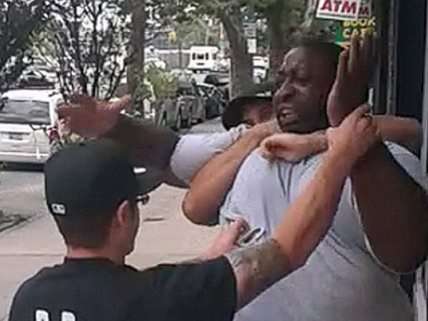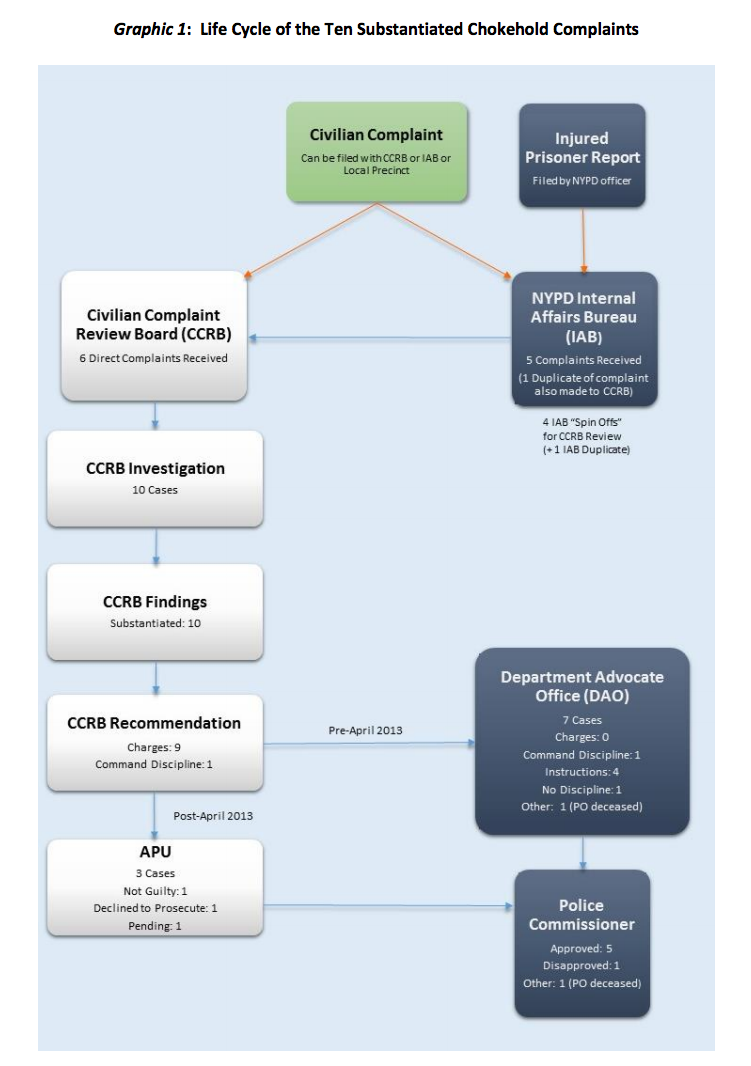Use of Chokeholds "Alarming," Says NYPD Inspector General's Report
Disciplining offending officers is "complex" and "inconsistent."
New York City's newly created Office of the Inspector General for the

NYPD (OIG-NYPD) issued its first report Monday, titled "Observations on Accountability and Transparency in Ten NYPD Chokehold Cases" and found that "the disciplinary process is complex, multi-tiered, and often delivers inconsistent results."
OIG-NYPD only investigated the most recent cases in which the Civilian Complaint Review Board (CCRB) determined that NYPD officers used chokeholds which are specifically banned in the NYPD's Patrol Guide, but not illegal under city or state law. This "focused review" is not meant to be a comprehensive study, but rather a "road map of key policing issues with regard to the use of force."
As detailed in the report's Executive Summary, complaints originate from the CCRB, which recommends charges that are generally dismissed or downgraded by the NYPD's Department Advocate's Office (DAO), before eventually reaching the Police Commissioner. In the cases profiled in the report, the commissioner rejected all the CCRB's disciplinary recommendations "without explanation":
CCRB recommended Administrative Charges, the most serious level of NYPD discipline, in nine of the ten cases studied. In the one chokehold case where CCRB recommended something less than Administrative Charges – the case of an officer who died before. CCRB's recommendation was reviewed or acted upon – CCRB recommended Command Discipline.
NYPD's Department Advocate's Office (DAO) – the NYPD unit that prosecutes NYPD disciplinary matters and, until April 11, 2013, was responsible for prosecuting all substantiated use-of-force cases – handled seven of the ten substantiated cases reviewed for this study. CCRB recommended Administrative Charges in six of those seven cases, but none of these substantiated chokehold cases ever went to trial before a NYPD Trial Commissioner. Instead, DAO departed from CCRB's recommendation every time. Rather than pursue the more serious Administrative Charges, DAO proposed -- a lesser penalty -- in four cases, Command Discipline in one case, and no discipline whatsoever in one case.
The Police Commissioner made a final determination about discipline in six of the ten cases reviewed for this study. All six times, the Police Commissioner rejected the disciplinary recommendation of CCRB, imposing a less severe penalty than that recommended by CCRB or deciding that no discipline was warranted at all.
In thr infographic below, the life and death cycle of chokehold complaints against the NYPD is illustrated:

Also noted in the report, "in several of the ten cases reviewed, NYPD officers employed prohibited first act of physical force (emphasis in original) in response to verbal resistance, as opposed to first attempting to defuse the situation." The report doesn't infer an epidemic of chokeholding cops, but it does note that the date has led the OIG-NYPD to "assess whether NYPD is adequately teaching and reinforcing effective communication skills and de-escalation tactics to all of its officers."
Editor's Note: As of February 29, 2024, commenting privileges on reason.com posts are limited to Reason Plus subscribers. Past commenters are grandfathered in for a temporary period. Subscribe here to preserve your ability to comment. Your Reason Plus subscription also gives you an ad-free version of reason.com, along with full access to the digital edition and archives of Reason magazine. We request that comments be civil and on-topic. We do not moderate or assume any responsibility for comments, which are owned by the readers who post them. Comments do not represent the views of reason.com or Reason Foundation. We reserve the right to delete any comment and ban commenters for any reason at any time. Comments may only be edited within 5 minutes of posting. Report abuses.
Please to post comments


NYPD officers used chokeholds which are specifically banned in the NYPD's Patrol Guide, but not illegal under city or state law.
And the consequences for violating NYPD policy are?
Yeah, that's what I thought.
"Complied with policy" is an absolute defense.
"Violated policy" is, well, who care?
And the consequences for violating NYPD policy are?
Training, R C -- more *training* for *everyone*.
It's a two-week paid leave!
Lemme guess:
That training can be done on overtime, so you wind up getting paid extra when policy is violated.
Incentives. How the fuck do they work?
The Police commissioner and the Police In General should not be part of this process. This is the Main Problem.
At the end of the day, the Police commissioner has the final say and the matter goes no where.
This is where the public frustration lies.
Agreed. The Police Commissioner has a clear conflict of interest. Even if he wanted to (and he probably doesn't), he can't overrule (the already hated) internal review boards as that will cause a mutiny.
Seems legit. Good choke. SMOOCHES
Rooll em up and ship em out dude.
http://www.Web-Privacy.tk
Wait, a "first act of physical force in response to verbal resistance" is purportedly prohibited?! Meaning the cop can't try to force your hands behind your back, say, so long as you're only verbally declining the invitation to go to the station? Cool!